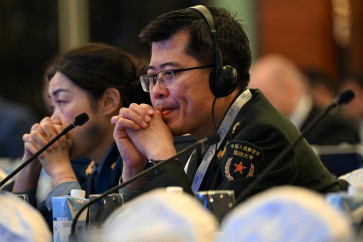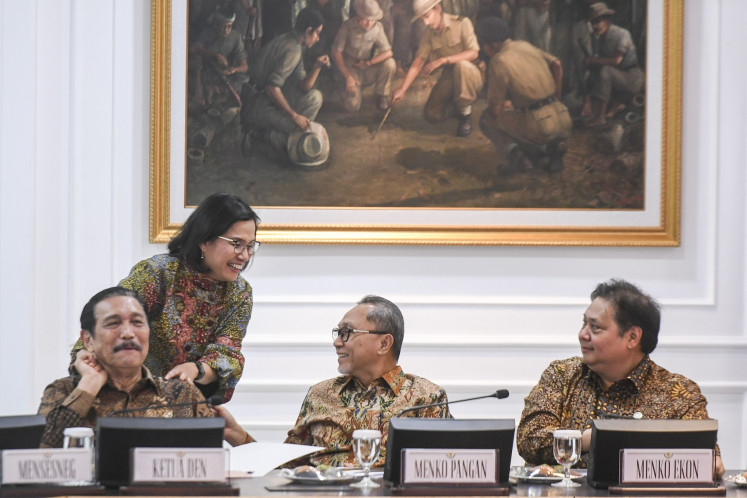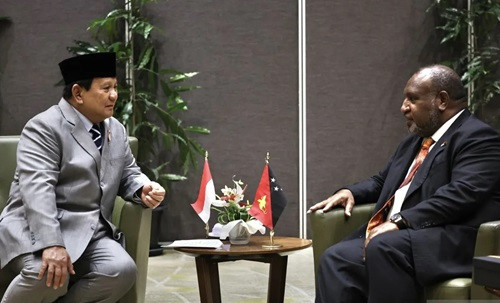2019 Mandiri Investment Forum Highlights investment opportunities in RI
Sharing insights: Speakers of the 2019 Mandiri Investment Forum, including state-owned securities company Mandiri Sekuritas president director Silvano Rumantir (second right), state-owned lender Bank Mandiri vice president director Sulaiman Arif Arianto (third right), Finance Minister Sri Mulyani Indrawati (fifth right) and Bank Indonesia Governor Perry Warjiyo (fourth right), pose for a photograph along with other panelists on the sidelines of the forum in Jakarta on Wednesday
Change text size
Gift Premium Articles
to Anyone

S
haring insights: Speakers of the 2019 Mandiri Investment Forum, including state-owned securities company Mandiri Sekuritas president director Silvano Rumantir (second right), state-owned lender Bank Mandiri vice president director Sulaiman Arif Arianto (third right), Finance Minister Sri Mulyani Indrawati (fifth right) and Bank Indonesia Governor Perry Warjiyo (fourth right), pose for a photograph along with other panelists on the sidelines of the forum in Jakarta on Wednesday. The forum, held from Jan. 29 to Feb. 1, seeks to boost investment in Indonesia.
For the eighth time, state-owned lender Bank Mandiri, along with the lender’s securities firm Mandiri Sekuritas and United States-based global investment bank Jefferies, has organized its annual Mandiri Investment Forum (MIF).
The 2019 MIF demonstrates Bank Mandiri’s consistency in its effort to attract foreign direct investment (FDI) to Indonesia to boost the country’s economic growth.
This year, the MIF was organized from Jan. 29 to Feb. 1 at the Fairmont Jakarta hotel, Senayan, Central Jakarta. The forum was attended by around 700 investors, comprising 90 foreign investors and 200 corporate clients of Bank Mandiri. The 2018 MIF, meanwhile, was attended by more than 500 investors, including 120 institutional foreign exchange market investors who, collectively, manage a fund worth US$4 trillion.
The forum explored three core issues: the global and national economic outlook this year; strategies to attract FDI to Indonesia; and strategies to boost Indonesian human resources’ competence to suit industrial needs, keeping future industrial trends and developments in mind.
Specifically, the three-day event was divided into two main conferences: on Jan. 30, the forum hosted its macro day, which gave participants unprecedented access to presentations by high-ranking ministers as well as representatives from the Indonesian central bank and business leaders, who shared their views on the economy and investment in Indonesia.
The macro day conference was attended by Bank Indonesia Governor Perry Warjiyo, Finance Minister Sri Mulyani Indrawati, State-Owned Enterprises Minister Rini Soemarno, the Finance Ministry’s fiscal policy head, Suahasil Nazara, Mandiri Institute Advisory Board chairman and former finance minister M. Chatib Basri and Jefferies chief strategist Sean Darby.
On Jan. 31 and Feb. 1, meanwhile, the forum hosts its corporate day, focusing on one-on-one and/or small group meetings between the management of large to mid-cap Indonesian companies and institutional investors. Before these two conferences were held, the forum committee had taken participants on a pre-conference site visit comprising thematic trips on Jan. 28 and 29.
During these pre-conference trips, Bank Mandiri and Mandiri Sekuritas took the investors to various potential locations for investments such as several financial technology company headquarters, hospitals and traditional and modern markets that have already incorporated digital technology into their businesses.

According to Bank Mandiri vice president director Sulaiman Arif Arianto, the eighth MIF carries the theme “Invest Now”, which signals that investors – institutional and retail alike – should not lose out on the opportunity to invest in Indonesia.
“The 2019 MIF will focus on producing strategic solutions for decision makers and private investors in navigating the business landscape [in Indonesia], as we are being overshadowed by the trend of global economic austerity as well as Indonesia’s ongoing political year,” Sulaiman said in his speech during the opening of the 2019 MIF on Jan. 30.
Sulaiman said the national banking sector, which is one of the industrial sectors that is ready to support economic investments to Indonesia, was currently one of the best economic performers in the country, with an annual credit growth ratio of around 12 percent and a stable non-performing loan ratio below 3 percent as of November 2018.
“Despite still struggling to cope with the challenges and influences with the fourth industrial revolution [powered with real-time big-data processing], we are confident that the banking sector will continue to contribute optimally to the national economy and become the catalyst of its growth, supported by the sector’s maintenance of its asset quality, strong capital ratio, as well as operational cost efficiency,” he said.
“[The operational cost efficiency is] thanks to the sector’s innovation in digital banking and financial instruments, along with the strong domestic consumption.”
In its most recent research report, Mandiri Group economists approximate that Indonesia’s economy will grow by 5.22 percent in 2019, a forecast based on the country’s gross national product growth in 2018, which amounted to 5.16 percent.

" We have a stable domestic consumption trend, with our household consumption rate growing strongly, more than 5 percent. We are also able to maintain our inflation at a level of around 3 percent. "
_____________
To accomplish this growth, the report asserts, Indonesia needs to push its manufacturing sector forward to develop rapidly so that the sector can accelerate a more evenly distributed and stable economic growth in the country, while absorbing more laborers into the workforce.
Currently, Indonesia ranks fourth on the list of countries with the biggest human resources potentials in the world. Indonesia, unfortunately, has yet to be able to optimally tap into its huge potential of talents due to a paucity of skilled human resources.
“We have a stable domestic consumption trend, with our household consumption rate growing strongly, more than 5 percent. We are also able to maintain our inflation at a level of around 3 percent. Besides that, we also make use of our fiscal policy to support economic growth, especially through taxation incentive instruments,” Sri Mulyani said.
She added that to push for sustainable economic growth, the government was well aware that Indonesia needed to boost the quality of its human resources – be it in terms of education or health. Therefore, she continued, the government had decided to focus the 2019 state expenditure on human resources development, infrastructure development and social security networks.

Perry, meanwhile, said that despite the global uncertainty and uncertainties surrounding the upcoming presidential election in Indonesia, he believed that now was the right time to invest in the country.
“There are two reasons [to invest in Indonesia now], namely: a stable macroeconomic state as well as synchronized governmental macroeconomic policies, which create a climate conducive to investment,” he said.
Perry added he was optimistic that the rupiah exchange rate against the US dollar would become more stable or even strengthen this year and, therefore, it would have a positive impact on national economic growth.
He pointed out that Indonesia had recently received a big volume of foreign funds, not to mention the Fed fund rate hike this year would be lower than that of last year.
He added that, currently, the central bank and the government could synergize strongly to help the rupiah’s fundamentals get better and the foreign exchange market mechanism get more flexible.

Photos JP/Arief Suhardiman









